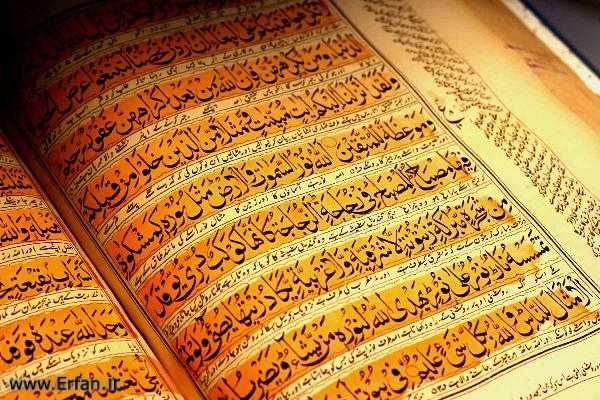
By: Mohammad Sobhanie
Religious Illiteracy
بِسْمِ اللَّـهِ الرَّحْمَـٰنِ الرَّحِيمِ
وَمِنْهُمْ أُمِّيُّونَ لَا يَعْلَمُونَ الْكِتَابَ إِلَّا أَمَانِيَّ وَإِنْ هُمْ إِلَّا يَظُنُّونَ ﴿٧٨﴾ فَوَيْلٌ لِّلَّذِينَ يَكْتُبُونَ الْكِتَابَ بِأَيْدِيهِمْ ثُمَّ يَقُولُونَ هَـٰذَا مِنْ عِندِ اللَّـهِ لِيَشْتَرُوا بِهِ ثَمَنًا قَلِيلًا ۖ فَوَيْلٌ لَّهُم مِّمَّا كَتَبَتْ أَيْدِيهِمْ وَوَيْلٌ لَّهُم مِّمَّا يَكْسِبُونَ ﴿٧٩﴾
Translation:
2:78 And among them are the illiterate who know nothing of the Book except hearsay (wishful thinking and beliefs), and they rely only on conjectures.
2:79 So woe to them who write the Book with their hands and then say, ‘This is from Allah,’ that they may sell it for a paltry gain. So woe to them for what their hands have written, and woe to them for what they earn!
Commentary: Religious illiterates and intellectually dishonest scholars are equally reprimanded in the aforementioned verses. The former group is reprimanded for their lack of will to learn the divine scripture, and the latter for altering and distorting the truth for their personal gain. Although the discussion is about the states of mind and spiritual predicament of Israelites, the plight of religious illiteracy and dishonest intellectual leadership still remains true in contemporary times.
Illiteracy is defined as the inability to read and write proficiently. It also refers to a lack of basic knowledge and skills in a particular field. For instance, computer illiteracy is the inability to use computers and related technologies without assistance. Similarly, religious illiteracy, or religious ignorance, is a lack of understanding of the basic tenets of belief.
The verse 2:78 says that among the Children of Israel there were religious illiterates [Arabic: (أُمِّيُّونَ)] who had no knowledge of the scripture. Their knowledge of religion was based on the unsubstantiated assertions [Arabic: (أَمَانِيَّ)] of unfaithful scholars. Hence, conjecture [Arabic: (ظن)] is the guide of illiterate people instead of accurate knowledge and facts [Arabic: (علم و یقین)]:
وَمِنْهُمْ أُمِّيُّونَ لَا يَعْلَمُونَ الْكِتَابَ إِلَّا أَمَانِيَّ وَإِنْ هُمْ إِلَّا يَظُنُّونَ ﴿٧٨﴾
2:78 And among them are the illiterate who know nothing of the Book except hearsay (wishful thinking and beliefs), and they rely only on conjectures.
Also, among the Children of Israel were unfaithful scholars who altered the meaning of the scriptures and disseminated fabricated narratives in the name of God for the consumption of illiterates:
فَوَيْلٌ لِّلَّذِينَ يَكْتُبُونَ الْكِتَابَ بِأَيْدِيهِمْ ثُمَّ يَقُولُونَ هَـٰذَا مِنْ عِندِ اللَّـهِ……. ﴿٧٩﴾
2:79 So woe to them who write the Book with their hands and then say, ‘This is from Allah,’
The scholars of religion, who are the inheritance of the divine messengers, are expected to preach and promote divine truth for the wellbeing of humanity; Allah (SWT) rewards them amply for their effort. Nevertheless, dishonest scholars trade eternal reward for worthless worldly gains [Arabic: (ثَمَنًا قَلِيلًا)]:
لِيَشْتَرُوا بِهِ ثَمَنًا قَلِيلًا ۖ ……. ﴿٧٩﴾
2:79 that they may sell it (distorted scriptures and fabricated narratives) for a paltry gain.
In the end, the verse warns scholars against the alteration and distortion of the truth and admonishes them for demeaning themselves for worldly gain.
فَوَيْلٌ لَّهُم مِّمَّا كَتَبَتْ أَيْدِيهِمْ وَوَيْلٌ لَّهُم مِّمَّا يَكْسِبُونَ ﴿٧٩﴾
2:79 So woe to them for what their hands have written, and woe to them for what they earn!
Word-for-Word Translation:
[وَمِنْهُمْ] and among them [أُمِّيُّونَ] are unlettered people who [لَا يَعْلَمُونَ] do not know [الْكِتَابَ] the book [إِلَّا أَمَانِيَّ] but false desire. And not [وَإِنْ] they [هُمْ] but [إِلَّا] guess [يَظُنُّونَ]
[فَوَيْلٌ] so woe [لِّلَّذِينَ] to those who [يَكْتُبُونَ] write [الْكِتَابَ] the book [بِأَيْدِيهِمْ] with their own hands [ثُمَّ] then [يَقُولُونَ] they say [هَـٰذَا] this [مِنْ عِندِ] is from [اللَّـهِ] Allah. [ لِيَشْتَرُوا] That they may purchase [بِهِ] with [ثَمَنًا] price (gain) [قَلِيلًا] little. [فَوَيْلٌ] so woe [لَّهُم] to them [مِّمَّا] for what [كَتَبَتْ] wrote [أَيْدِيهِمْ] their hands [وَوَيْلٌ] and woe [ لَّهُم] to them [مِّمَّا] for what [يَكْسِبُونَ] they earn.
The word “ummiyn” [Arabic: (أُمِّيُّونَ)] in the aforementioned verse is equivalent to the “religious illiterate”.
The phrase “um” [Arabic: (ام)] means mother. The word “ummiyun” [Arabic: (امیون)] is the plural form of the word “ummi” [Arabic (امی)] and means a person who stayed at the same level of knowledge and skillset that he was born with, which is illiteracy.
The phrase “amaniyy” [Arabic: (امانی)] is the plural form of “amniyyah” [Arabic:(امنیه)] means wish and here; it may refer to the wishful thinking and belief, or a belief that appeals to desires rather than reality. For instance, the Children of Israel wishfully believed that they were the children of God and His friends [Al-Maida 5:18].
The phrase “wawaylun” [Arabic: (وَيْلٌ)] is woe, disaster, severe punishment, adversity, and affliction.
source : en.shafaqna.com













